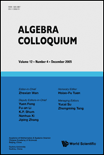
ALGEBRA COLLOQUIUM
Scope & Guideline
Fostering a Community of Algebra Enthusiasts and Experts
Introduction
Aims and Scopes
- Algebraic Structures and Theory:
Research on the properties and classifications of various algebraic structures, including groups, rings, modules, and algebras. This includes investigations into their symmetries, representations, and transformations. - Graph Theory and Algebraic Combinatorics:
Exploration of the interplay between algebra and graph theory, focusing on algebraic properties of graphs, eigenvalues, and their applications in combinatorial structures. - Homological Algebra:
Studies related to homological dimensions, derived categories, and the development of homological techniques to solve problems in algebra. - Quantum and Noncommutative Algebra:
Research focusing on quantum groups, noncommutative algebras, and their cohomological aspects, exploring the algebraic structures arising in quantum theory and their applications. - Module Theory and Representation Theory:
Examination of modules over rings, including properties of tilting modules, projective and injective modules, and representation theory of algebras. - Geometric and Topological Methods in Algebra:
Investigations into the geometric aspects of algebraic structures, including algebraic topology and its connections with algebra.
Trending and Emerging
- Categorical and Homotopical Methods:
A growing trend towards using categorical and homotopical approaches in algebra, emphasizing the importance of derived categories and triangulated categories in understanding algebraic structures. - Representation Theory of Algebras:
An increased focus on representation theory, particularly in the context of noncommutative and quantum algebras, showcasing its relevance in modern algebraic research. - Computational Algebra:
Emerging interest in computational techniques within algebra, including algorithmic approaches to solving algebraic problems and the development of software for algebraic computations. - Algebraic Geometry Connections:
An increasing intersection between algebra and algebraic geometry, with research exploring the algebraic properties of geometric objects and their implications in algebra. - Quantum Algebra and Hopf Algebras:
A significant rise in research related to quantum algebra and Hopf algebras, reflecting the growing importance of these structures in both algebra and theoretical physics.
Declining or Waning
- Classical Group Theory:
While classical group theory has been foundational, recent publications indicate a reduced focus on classical results in favor of more modern algebraic structures and their applications. - Elementary Algebraic Structures:
There appears to be a decreased emphasis on foundational topics such as elementary ring and field theory, as researchers pursue more complex and abstract algebraic concepts. - Linear Algebra Techniques:
Traditional linear algebra methods are less frequently the main focus of research, with a noticeable shift towards more abstract and generalized algebraic frameworks. - Basic Commutative Algebra:
The area of basic commutative algebra, often foundational in earlier studies, is seeing a decline as interest shifts toward more advanced topics such as homological and noncommutative algebra.
Similar Journals

RENDICONTI DEL SEMINARIO MATEMATICO DELLA UNIVERSITA DI PADOVA
Fostering a vibrant community of mathematical exploration and discovery.RENDICONTI DEL SEMINARIO MATEMATICO DELLA UNIVERSITA DI PADOVA, published by the European Mathematical Society, stands as a notable open-access journal with a rich history in disseminating research across various domains of mathematics. With an ISSN of 0041-8994 and E-ISSN 2240-2926, this journal has embraced open access since 2023, significantly enhancing its visibility and accessibility to a global audience. Situated in Germany, its publishing house is based at Technical University Berlin, which emphasizes its academic roots and dedication to fostering mathematical research. The journal features a quartile ranking of Q3 across multiple categories including Algebra and Number Theory, Analysis, Geometry and Topology, and Mathematical Physics as of 2023, indicating a vibrant contribution to the field, despite its challenge in specific rankings. Researchers, professionals, and students alike will find in this journal a platform for innovative ideas and significant findings that are crucial to the evolution of modern mathematics.
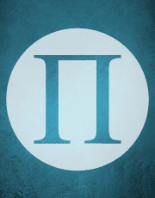
Forum of Mathematics Pi
Navigating the Landscape of Mathematical DiscoveryForum of Mathematics Pi, published by Cambridge University Press, stands at the forefront of mathematical research, providing an open-access platform since 2013. With an ISSN of 2050-5086, this journal has rapidly established itself within the mathematical community, particularly noted for its high impact in the realms of Algebra and Number Theory, Analysis, Discrete Mathematics and Combinatorics, Geometry and Topology, Mathematical Physics, and Statistics and Probability, as evidenced by its 2023 Q1 rankings across these categories. Its placement within the top quartile signifies its importance and influence, attracting submissions from leading researchers and academicians around the globe. The journal’s diverse scope and rigorous peer-review process ensure a high standard of scholarly excellence, making it an indispensable resource for professionals, students, and researchers eager to stay informed about cutting-edge mathematical advancements. Access to its comprehensive array of articles is openly available, promoting a culture of collaboration and knowledge sharing in the mathematics community.

MICHIGAN MATHEMATICAL JOURNAL
Pioneering Insights in the World of MathematicsThe MICHIGAN MATHEMATICAL JOURNAL is a prestigious and influential publication in the field of mathematics, founded by the University of Michigan. With an ISSN of 0026-2285 and an E-ISSN of 1945-2365, this journal is recognized for its high-quality research and has achieved a commendable Q1 ranking in the category of Mathematics (miscellaneous) as of 2023. Published by the esteemed Michigan Mathematical Journal, it provides a platform for the dissemination of innovative mathematical theories and findings, playing a crucial role in advancing knowledge and scholarship within the mathematical community. With coverage spanning from 1996 to 2024, the journal emphasizes rigorous theoretical development and fosters collaboration among researchers, professionals, and students alike. While not an open-access journal, its contributions are invaluable for those looking to stay abreast of cutting-edge mathematical research.

International Electronic Journal of Algebra
Connecting Scholars: Where Algebra Meets DiscoveryThe International Electronic Journal of Algebra (IEJA) is a premier open-access platform dedicated to advancing research in the field of algebra and number theory. Established in Turkey and published by IEJA-INT ELECTRONIC JOURNAL ALGEBRA, this journal has been providing unrestricted access to high-quality scholarly articles since 2007, facilitating the dissemination of valuable findings and innovative methodologies to a global audience. With an ISSN of 1306-6048 and a notable Scopus rank of 85 out of 119 in its category, IEJA contributes significantly to the mathematical community, evidenced by its Q3 quartile ranking in Algebra and Number Theory as of 2023. Researchers, professionals, and students can engage with a diverse range of topics in algebra, enhancing both theoretical understanding and practical applications in this vital area of mathematics. As a journal committed to fostering collaboration and progress, IEJA stands out as an essential resource for anyone seeking to contribute to and learn from the evolving discourse in algebra.

CZECHOSLOVAK MATHEMATICAL JOURNAL
Charting New Territories in MathematicsCzechoslovak Mathematical Journal is a distinguished academic journal published by Springer Heidelberg, dedicated to advancing the field of mathematics through the dissemination of high-quality research. With an ISSN of 0011-4642 and E-ISSN 1572-9141, this journal has been a pivotal platform for mathematicians and researchers from around the globe since its inception. The journal holds a Q3 ranking in the field of Mathematics (miscellaneous), demonstrating its commitment to providing a forum for the latest mathematical theories and applications, particularly in general mathematics, as indicated by its Scopus rank of #285/399 and 28th percentile in the field. While currently not offering open access options, the journal continues to attract a wide readership by making its valuable content available through traditional subscription models. The Czechoslovak Mathematical Journal serves as an essential resource for researchers, professionals, and students aiming to stay informed about recent developments and breakthroughs in mathematics, with focus years converging from 1995 to 2024.
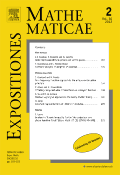
EXPOSITIONES MATHEMATICAE
Cultivating Knowledge in the Heart of Mathematical InquiryEXPOSITIONES MATHEMATICAE, published by Elsevier GmbH, stands as a significant journal in the realm of mathematics, catering primarily to researchers, professionals, and students. With an ISSN of 0723-0869 and an E-ISSN of 1878-0792, this journal has made its mark in the academic community, boasting a Q2 classification in the miscellaneous mathematics category for 2023, illustrating its prominence within its field. The journal addresses a diverse scope of mathematical topics, encouraging the publication of original research and innovative theories while maintaining rigorous academic standards. As it converges from 2004 to 2024, EXPOSITIONES MATHEMATICAE continues to be an essential resource for advancing mathematical knowledge and fostering scholarly communication, despite being a non-open-access publication. Its location in Munich, Germany further anchors it within a rich intellectual tradition, providing accessibility for the mathematical community worldwide.

TRANSACTIONS OF THE AMERICAN MATHEMATICAL SOCIETY
Elevating the Standards of Mathematical ScholarshipTRANSACTIONS OF THE AMERICAN MATHEMATICAL SOCIETY, published by the American Mathematical Society, is a premier journal in the field of mathematics that has been contributing to the advancement of mathematical knowledge since 1900. With an ISSN of 0002-9947 and an E-ISSN of 1088-6850, this journal holds a prestigious position in the academic landscape, evidenced by its Q1 rankings in both Applied Mathematics and Miscellaneous Mathematics categories as of 2023. With a Scopus ranking of #97 in General Mathematics and a percentile standing of 75th, the journal is recognized for its rigorous peer-review process and the quality of the research it publishes. Though it does not currently offer open access options, it essentially serves as a vital resource for researchers, professionals, and students seeking critical insights and developments in mathematical theory and applications. The Transactions aim to publish high-quality research articles that foster the exchange and dissemination of ideas, supporting the growth of both theoretical and applied mathematics within the global scholarly community.
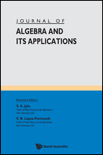
JOURNAL OF ALGEBRA AND ITS APPLICATIONS
Charting New Territories in Algebraic Research and ApplicationJOURNAL OF ALGEBRA AND ITS APPLICATIONS, published by WORLD SCIENTIFIC PUBL CO PTE LTD, stands as a pivotal resource for scholars in the fields of Algebra and Applied Mathematics. With an ISSN of 0219-4988 and E-ISSN 1793-6829, this journal has been providing a forum for the dissemination of cutting-edge research since its inception in 2008, converging towards a forward-looking timeline extending to 2024. As of 2023, it has earned a commendable Q2 ranking in both Algebra and Number Theory, as well as Applied Mathematics, reflecting its solid impact within the mathematical community. With a Scopus rank of #49/119 in Algebra and Number Theory, and #420/635 in Applied Mathematics, the journal captures significant advancements and applications across various mathematical domains. While it does not operate under an open access model, its comprehensive articles and research outputs are crucial for fostering intellectual dialogue and innovation in academia. Researchers, professionals, and students alike will find this journal an indispensable asset for their scientific pursuits and explorations into the vast field of mathematics.

Algebra And Discrete Mathematics
Advancing Mathematical Knowledge through Rigorous ResearchAlgebra And Discrete Mathematics, published by LUHANSK TARAS SHEVCHENKO NATIONAL UNIVERSITY, is a pivotal academic journal dedicated to exploring the realms of algebra and discrete mathematics. Since its inception in 2012, this journal has contributed significantly to the mathematical community, catering to researchers, professionals, and students interested in advancing their understanding of both classical and contemporary mathematical theories. With categories placed in Q4 in Algebra and Number Theory and Q3 in Discrete Mathematics and Combinatorics, and rankings that place it among various domains with percentiles reflecting its niche status, the journal offers a platform for innovative and high-quality research. While the journal is currently not open access, it maintains a robust academic presence, and its continuous publication until 2024 ensures a steady stream of scholarly discourse. Researchers and academics keen on disseminating their findings or keeping abreast of the latest developments in these mathematical fields will find valuable insights and diverse methodologies within its pages.
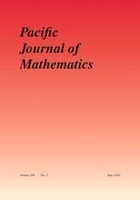
PACIFIC JOURNAL OF MATHEMATICS
Advancing Mathematical Inquiry Since 1951The PACIFIC JOURNAL OF MATHEMATICS, established in 1951 and published by Mathematical Sciences Publishers, is a premier peer-reviewed journal in the field of mathematics, renowned for its rigorous scholarship and impactful research contributions. With an HIndex that reflects its sustained academic influence, this journal has been categorized within the Q1 quartile in the field of mathematics (miscellaneous) as of 2023, showcasing its position among the top-tier mathematics journals globally. Although the journal operates under a traditional subscription model rather than an Open Access format, it remains dedicated to disseminating original research that spans various domains within mathematics. Researchers, professionals, and students alike will find the journal's breadth of topics and commitment to quality work instrumental in advancing their understanding and exploration of mathematical concepts. This esteemed journal continues to thrive as a vital resource for the mathematical community through its comprehensive collection of articles from a diverse range of mathematical disciplines, thus maintaining a significant role in shaping the future of mathematical inquiry.